Advertisement
Published: January 27th 2007
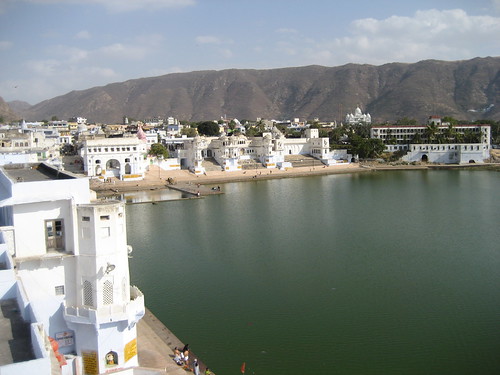

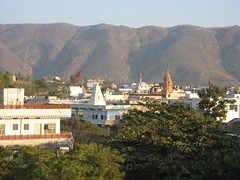



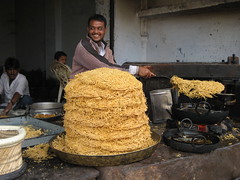
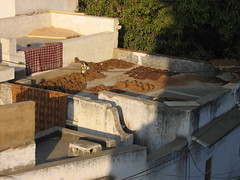



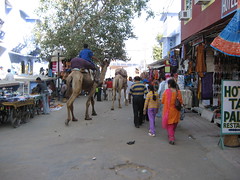

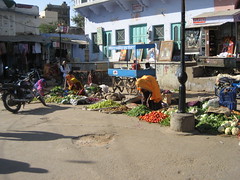

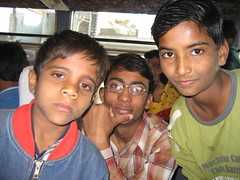
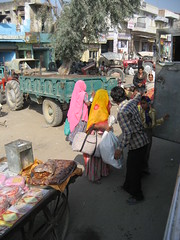


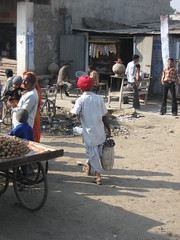

It was a bit shaky getting out of the Jaipur bus station. There were lots of buses and no one seemed to know which one went to Pushkar. Standing there with me were three Italian women who were just as confused. Someone finally told us which bus was ours’ so I put my pack in the back storage compartment. Just as the bus began to leave, another guy said it was the wrong one. My hands were full but this spunky Italian woman chased after the bus, opened the hatch and grabbed my bag just in the knick of time. I just stood there watching and was totally impressed! That was the start of my friendship with Valeria from Palermo, Sicily.
Indians consider Pushkar to be a holy city because it sits on a lake that is said to have formed exactly where the Hindu god Brahma dropped a lotus flower. Pilgrims flock to this town and its holy status means that the consumption of alcohol, meat and eggs is strictly prohibited. It is permitted, however, to use opium, heroin and pot. When I asked my hotel what was in the “special” lassi, I was told it was marijuana. “Special” drinks are on the menus all over town and, along with them, the expected laid back hippy crowd.
For a holy lake, it looks anything but—largely due to the plastic and trash floating around its edges. As I neared the steps (ghats) that lead down to the lake, a “priest” approached. Ever suspicious, I asked if he wanted money. He was quick to say “No madam, only respect. I am Brahman priest, only respect”. He puts a flower in my palm, has me remove my shoes and leads me down to the water’s edge where he anoints my forehead with holy water from the dirty lake. As soon as these “rituals” are completed, he hits me up for an offering payment. “Only 100, 200 rupees madam—priestly offering madam”. I just walked away from this blatant trickery—especially under the pretense of religion. I expected him to pursue me but he didn't even bother.
In a holy city, you’d expect cows to reign supreme—and they do. They know it too. There are so many of them that you begin to ignore them. One morning, I was walking towards just another cow when it used its horns to push me to the side. Cheeky devil! Along with holy cows comes a lot of holy poop. It’s a real obstacle course to avoid slipping and sliding through it. Actually, Indians see it as a sign of good luck for one to leave its deposit in front of your doorway. They do have a good use for it though—and I don’t mean fertilizer. All over the rooftops you can see cow paddies drying in the sun. In the winter they burn it for heat.
That afternoon Valeria showed up at my hotel. She was having some problems with here traveling companions and wanted someone to talk to. We took a stroll around the lake, hearing reminders to take off our shoes at every set of ghats we came to. These are also holy places. You see many men stripped down and bathing naked in the lake’s water. Sadus (holy men) in safron colored robes are ever present. Even with the junk in the water, it’s a pretty little lake with old white temples around its shore and the reflection of the mountains on its surface.
My new Sicilian friend is a teacher back home. She’s expressive, direct and fun and we hit it off. We talked of swapping homes and visiting each other’s country. Later we met for dinner and watched the setting sun’s reflection on the water. After our meal we stopped in a shop where I found a lovely embroidered wall hanging covered with little mirrors. Prices are very low here considering the quality of the workmanship.
Pushkar is certainly on the tourist track with plenty of Indian versions of western style clothes, “German” bakeries and the like. With the tourists also come aggressive beggars. Usually, I don’t give to beggars because babies and children are exploited by adults for money and it keeps kids on the streets and out of school. This one boy kept pestering me for rupees and I was trying to ignore him—but I couldn’t. He kept shadowing me. At one clean-looking food stall, I ordered some dahl. It wasn’t long before he was there again motioning that he wanted to eat. I felt so bad when I realized he was hungry and handed him the bowl. Your conscience tugs at you all the while you are here in India. It’s not a comfortable place to be in that respect. I keep thinking I’ll find a worthwhile charity to give to but I wonder if I’m looking that hard.
One thing about being asked questions by Indians is that you can reciprocate. My hotel is run by a family of sons and one is getting married next month. I asked if he chose his bride and he said he did. His family was approached by her sister about marriage and they (he and his parents) drove the 200 Km to visit her. He has seen her three times and “Yes, he is choosing her—she seems to be good marriage material”. He is a modern, attractive man who has traveled internationally, yet he says that this system works very well in India and there are few divorces.
There are also few girls. When you stay in family run hotels and view neighboring rooftop terraces, you get an inside look at the family makeup. There is a definite dearth of girl children everywhere I go. While no one speaks of it, it is not uncommon for baby girls to be aborted or killed at birth. Girls require a huge dowry payment when they marry. This system puts a very heavy financial burden on the family from which they may never recover. The daughters then go off to live with the husband’s family when they marry. Things aren’t likely to change in India until the dowry system is gone.
For New Years Eve, the hotel strung garlands of flowers around the restaurant. No drunken celebrations would go on here. One of the sons knocked on my door around 9:00 PM and handed me a fragrant rose saying, “Mamaji, this is for you. Happy New Year. They all call me Mama here—just as they did in Africa. It’s quite endearing, actually.
The hotels in India usually provide bus and train booking services—well worth the little it costs. They told me the direct bus was a 3/2 bus--meaning three seats on one side of the isle and two on the other. I didn’t really understand what that meant until 7:00 AM the next chilly morning. It means it’s the WORST POSSIBLE BUS IN ALL OF INDIA! It was super bumpy, the seat springs were shot and a couple of windows were missing. Besides that, it stopped at every podunk village along the way and took detours over dusty dirt roads. The good thing was that only a few people were on when I boarded so I was able to jockey around for the least drafty seat. After a couple of stops, there was standing room only. Several sets of school boys got on and off along the way—always asking the same set of questions—“What is your country, what are you called......................?” Some even wanted my autograph and asked me to write a few words in their notebooks.
At first, I was thinking that this was going to be six hours of torture. After it warmed up some, I began to see things differently. This was a real close-up view of rural life in India and it was proving to be very colorful. Every time we stopped, food vendors would board. Carts selling yummy looking fried things were passing them through the windows. Woman dressed in a rainbow of colors and men in bright turbans crowded around every stop. My camera was clicking continually.
Toilet breaks are almost nonexistent for women riders. The driver stopped only once during the six-hour ride to give the women time to use the facilities. Even then, we had to walk two blocks down the street to find them—asking along the way. These were the worst I’ve yet seen. I won’t go into details but let me just say that no pipes were involved in the drainage "system". We were all about to burst so it didn’t matter. The men, however, were able to stop along the side of the road any time and anywhere they pleased. After that, the rest of the ride was a breeze!
Advertisement
Tot: 0.257s; Tpl: 0.011s; cc: 13; qc: 49; dbt: 0.1283s; 1; m:domysql w:travelblog (10.17.0.13); sld: 1;
; mem: 1.1mb





















Keep Smiling
Mike Fossey
Bon voyage
Ricia (my wife's name is Patricia too, but she calls herself Pat). I stumbled upon your latest blog from Pushkar and decided to read all your blogs from day one. I have to say I admire your courage and your photography skills! During my years in the travel industry, I too was fortunate to visit many of the places you have seen and your blogs have brought those memories back to life. Thank you. Enjoy India - it's unique. The touts and beggars can be a bit off-putting but do as most of the Indians do: ignore them. They won't go away but it helps you to focus on what you came there to see. I decided some years ago that I couldn't help all the poor of India, so have directly supported one boy's education and have found it very rewarding - see my blog of last year's visit. He is now a young man and has recently completed a Master's degree in Political Science! May you continue to enjoy your travels and the wonderful experiences which they bring. Keep smiling! Mike Fossey